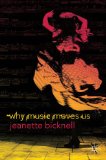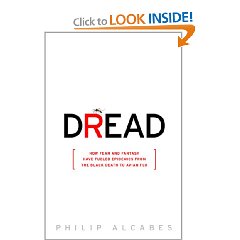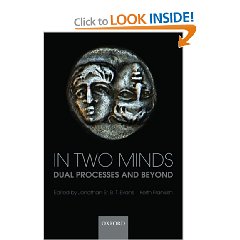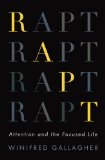April 30, 2009

Why Music Moves Us by Jeanette Bicknell (Palgrave MacMillan, 2009)
Product information from the publisher:
Surely you’ve experienced it before: you’re listening to a piece of music and all of a sudden you find a lump in your throat, a tear in your eye, or a chill down your spine. Whether it’s Beethoven’s Choral Symphony or The Verve’s ‘Bittersweet Symphony’, a bit of blues or a bit of baroque, music has the power to move us. It’s a language which we all speak. But why does it have this effect on us? What is going on, emotionally, physically and cognitively when listeners have strong emotional responses to music? What, if anything, do such responses mean? Can they tell us anything about ourselves? Jeanette Bicknell uses research in philosophy, psychology, neuroscience, and anthropology to address these questions, ultimately showing us that the reason why some music tends to arouse powerful experiences in listeners is inseparable from the reason why any music matters at all. Musical experience is a social one, and that is fundamental to its attractions and power over us.
The author’s website has a chapter-by-chapter synopsis.
Comments (0)
- culture,new books,philosophy of mind,psychology
April 28, 2009

Dread: How Fear and Fantasy have Fueled Epidemics from the Black Death to the Avian Flu by Philip Alcabes (PublicAffairs, April 13, 2009) appeared shortly before the current swine flu outbreak. (& it has a Kindle edition)
Product description from the publisher:
The average individual is far more likely to die in a car accident than from a communicable disease…yet we are still much more fearful of the epidemic. Even at our most level-headed, the thought of an epidemic can inspire terror. As Philip Alcabes persuasively argues in Dread, our anxieties about epidemics are created not so much by the germ or microbe in question—or the actual risks of contagion—but by the unknown, the undesirable, and the misunderstood.
Alcabes examines epidemics through history to show how they reflect the particular social and cultural anxieties of their times. From Typhoid Mary to bioterrorism, as new outbreaks are unleashed or imagined, new fears surface, new enemies are born, and new behaviors emerge. Dread dissects the fascinating story of the imagined epidemic: the one that we think is happening, or might happen; the one that disguises moral judgments and political agendas, the one that ultimately expresses our deepest fears.
See also: article at Smithsonian.com
Author’s website added 4/29
Comments (2)
- culture,happiness,new books
April 23, 2009
In Two Minds: Dual Processes and Beyond edited by Jonathan Evans and Keith Frankish (Oxford University Press, 2009)

(link for UK)
Product description from the publisher:
This book explores the idea that we have two minds – one that is automatic, unconscious, and fast, the other controlled, conscious, and slow. In recent years there has been great interest in so-called dual-process theories of reasoning and rationality. According to dual process theories, there are two distinct systems underlying human reasoning – an evolutionarily old system that is associative, automatic, unconscious, parallel, and fast, and a more recent, distinctively human system that is rule-based, controlled, conscious, serial, and slow. Within the former, processes are held to be innate and to use heuristics which evolved to solve specific adaptive problems. In the latter, processes are taken to be learned, flexible, and responsive to rational norms.
Despite the attention these theories are attracting, there is still poor communication between dual-process theorists themselves, and the substantial bodies of work on dual processes in cognitive psychology and social psychology remain isolated from each other. This book brings together leading researchers on dual-processes to summarize the state of the art, highlight key issues, present different perspectives, explore implications, and provide a stimulus to further work.
It includes new ideas about the human mind both by contemporary philosophers interested in broad theoretical questions about mental architecture and by psychologists specialising in traditionally distinct and isolated fields. For all those in the cognitive sciences, this is a book that will advance dual-process theorizing, promote interdisciplinary communication, and encourage further applications of dual-process approaches.
Comments (0)
- cognitive science,new books,philosophy of mind
April 19, 2009

Memory and the Computational Brain: Why Cognitive Science will Transform Neuroscience (Blackwell/Maryland Lectures in Language and Cognition) by C.R. Gallistel and Adam Philip King (Wiley-Blackwell, 2009)
Product Description
Memory and the Computational Brain offers a provocative argument that goes to the heart of neuroscience, proposing that the field can and should benefit from the recent advances of cognitive science and the development of information theory over the course of the last several decades.
* A provocative argument that impacts across the fields of linguistics, cognitive science, and neuroscience, suggesting new perspectives on learning mechanisms in the brain
* Proposes that the field of neuroscience can and should benefit from the recent advances of cognitive science and the development of information theory
* Suggests that the architecture of the brain is structured precisely for learning and for memory, and integrates the concept of an addressable read/write memory mechanism into the foundations of neuroscience
* Based on lectures in the prestigious Blackwell-Maryland Lectures in Language and Cognition, and now significantly reworked and expanded to make it ideal for students and faculty
Comments (0)
- cognitive science,new books
April 16, 2009

Rapt: Attention and the Focused Life by Winifred Gallagher (Penguin, 2009) also has a Kindle edition.
Product Description from the publisher:
Winifred Gallagher revolutionizes our understanding of attention and the creation of the interested life
In Rapt, acclaimed behavioral science writer Winifred Gallagher makes the radical argument that the quality of your life largely depends on what you choose to pay attention to and how you choose to do it. Gallagher grapples with provocative questions—Can we train our focus? What’s different about the way creative people pay attention? Why do we often zero in on the wrong factors when making big decisions, like where to move?—driving us to reconsider what we think we know about attention.
Gallagher looks beyond sound bites on our proliferating BlackBerries and the increased incidence of ADD in children to the discoveries of neuroscience and psychology and the wisdom of home truths, profoundly altering and expanding the contemporary conversation on attention and its power. Science’s major contribution to the study of attention has been the discovery that its basic mechanism is an either/or process of selection. That we focus may be a biological necessity— research now proves we can process only a little information at a time, or about 173 billion bits over an average life—but the good news is that we have much more control over our focus than we think, which gives us a remarkable yet underappreciated capacity to influence our experience. As suggested by the expression “pay attention,” this cognitive currency is a finite resource that we must learn to spend wisely. In Rapt, Gallagher introduces us to a diverse cast of characters—artists and ranchers, birders and scientists—who have learned to do just that and whose stories are profound lessons in the art of living the interested life. No matter what your quotient of wealth, looks, brains, or fame, increasing your satisfaction means focusing more on what really interests you and less on what doesn’t. In asserting its groundbreaking thesis—the wise investment of your attention is the single most important thing you can do to improve your well-being—Rapt yields fresh insights into the nature of reality and what it means to be fully alive.
Comments (0)
- cognitive science,consciousness,mind,new books







